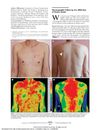 2 citations,
August 2021 in “Canadian Family Physician”
2 citations,
August 2021 in “Canadian Family Physician” COVID-19 can cause rashes and worsen existing skin conditions, and behaviors like frequent hand-washing can lead to hand dermatitis.

Any medication can cause skin reactions, some due to allergies and others due to dosage or genetic factors.
 157 citations,
August 2010 in “Lupus”
157 citations,
August 2010 in “Lupus” The document concludes that recognizing and treating cutaneous lupus erythematosus early is crucial for managing the skin and potential systemic symptoms.
[object Object]  86 citations,
May 2005 in “Seminars in Arthritis and Rheumatism”
86 citations,
May 2005 in “Seminars in Arthritis and Rheumatism” Kawasaki Disease is rare and often missed in adults, who show different symptoms than children, and may benefit from early treatment.
 6 citations,
July 2015 in “Australasian Journal of Dermatology”
6 citations,
July 2015 in “Australasian Journal of Dermatology” A man developed an allergic skin reaction after using brimonidine for rosacea.
 3 citations,
July 2015 in “Australasian Journal of Dermatology”
3 citations,
July 2015 in “Australasian Journal of Dermatology” A man developed an allergic skin reaction to a rosacea treatment and improved after stopping the medication and receiving allergy-specific care.
 August 2023 in “JOJ dermatology & cosmetics”
August 2023 in “JOJ dermatology & cosmetics” Antibiotics often cause skin reactions, making them a major health concern.
 December 2021 in “The Sri Lanka Journal of Dermatology”
December 2021 in “The Sri Lanka Journal of Dermatology” COVID-19 can cause various skin issues, including rashes and lesions.
March 2023 in “International Journal of Dermatology” Non-itchy rashes can indicate serious diseases like lupus.
 1 citations,
June 2020 in “Dermatologic Therapy”
1 citations,
June 2020 in “Dermatologic Therapy” COVID-19 can cause various skin issues, including rashes and 'COVID toes', and may worsen autoimmune diseases or affect men with baldness more severely.
 May 2023 in “Dermatology Reports”
May 2023 in “Dermatology Reports” The study found that skin conditions in COVID-19 patients can signal serious internal organ damage and may be life-threatening.
 1 citations,
October 2022 in “Current Dermatology Reports”
1 citations,
October 2022 in “Current Dermatology Reports” COVID-19 and vaccines cause various skin reactions and highlight the need for dermatologists in managing these issues and addressing vaccine distribution disparities.
 6 citations,
September 1990 in “International Journal of Gynecology & Obstetrics”
6 citations,
September 1990 in “International Journal of Gynecology & Obstetrics” The skin condition PUPP usually gets better on its own after giving birth and is unlikely to happen again in future pregnancies.
 March 2022 in “Journal of clinical case studies reviews & reports”
March 2022 in “Journal of clinical case studies reviews & reports” COVID-19 can cause different skin issues, including rashes and hair loss.
 8 citations,
June 2021 in “Journal of Cosmetic Dermatology”
8 citations,
June 2021 in “Journal of Cosmetic Dermatology” The review found that COVID-19 can cause skin problems, including rashes and issues from wearing PPE, and suggests more research and protective measures for healthcare workers.
 September 2020 in “Annals of the National Academy of Medical Sciences. India”
September 2020 in “Annals of the National Academy of Medical Sciences. India” COVID-19 can cause skin issues like "COVID toes," rashes, hair loss, and hand eczema, and dermatologists are important for recognizing these signs.
 7 citations,
January 1993 in “Rheumatology”
7 citations,
January 1993 in “Rheumatology” Most skin rashes in rheumatoid arthritis patients were not caused by their medication, and careful evaluation allowed most to keep taking their beneficial treatment.
 3 citations,
January 2008 in “Journal of the American Academy of Dermatology”
3 citations,
January 2008 in “Journal of the American Academy of Dermatology” A patient's skin rash did not affect the area where a previous viral rash was healing, suggesting a rare immune response.
91 citations,
July 2020 in “JAMA Dermatology” Minoxidil can improve hair growth in some patients with woolly hair due to LIPH variants, with varying responses and mild side effects.
 2 citations,
October 2016
2 citations,
October 2016 Chemotherapy and radiotherapy can cause skin side effects like rashes, hair loss, and nail changes, which are usually managed with conservative treatments.
 6 citations,
September 2010 in “Archives of Dermatology”
6 citations,
September 2010 in “Archives of Dermatology” Thermography matched the patient's pain levels in a shingles case and might help diagnose shingles without a rash.
[object Object]  9 citations,
July 2002 in “Journal of the European Academy of Dermatology and Venereology”
9 citations,
July 2002 in “Journal of the European Academy of Dermatology and Venereology” The document concludes that fexofenadine reduces inflammation in chronic hives, cholestyramine helps half of pregnant women with itchy rashes, and relaxing incisions are a good alternative in facial surgery for the elderly.

COVID-19 can cause skin problems and affect dermatology treatments, with recommendations for skin care and cautious use of certain drugs.
 149 citations,
July 2002 in “Dermatologic clinics”
149 citations,
July 2002 in “Dermatologic clinics” Patients with certain skin symptoms and high ANA titers should be monitored for potential systemic lupus.
 60 citations,
September 2013 in “Alimentary Pharmacology & Therapeutics”
60 citations,
September 2013 in “Alimentary Pharmacology & Therapeutics” Immunosuppressive and anti-TNF therapies in IBD patients can increase the risk of skin cancer and cause various skin issues.
 46 citations,
January 2015 in “Pediatric Rheumatology”
46 citations,
January 2015 in “Pediatric Rheumatology” Skin symptoms are important for diagnosing and managing juvenile-onset systemic lupus erythematosus and usually get better with treatment.
 32 citations,
September 1989 in “Medical Clinics of North America”
32 citations,
September 1989 in “Medical Clinics of North America” Skin problems are common in lupus, important for diagnosis, and can be triggered by sunlight.
 15 citations,
February 2017 in “Nursing Clinics of North America”
15 citations,
February 2017 in “Nursing Clinics of North America” Targeted cancer therapies can cause skin side effects, which should be treated early to help patients' quality of life and treatment adherence.
 2 citations,
January 2014 in “Elsevier eBooks”
2 citations,
January 2014 in “Elsevier eBooks” The document concludes that reactivation of herpesviruses, especially HHV-6, is linked to severe symptoms and complications in drug-induced hypersensitivity syndrome.
 1 citations,
January 2022 in “Advances in Dermatology and Allergology”
1 citations,
January 2022 in “Advances in Dermatology and Allergology” Most patients with cutaneous lupus erythematosus in Bangladesh are young women, with chronic forms and photosensitivity being common.




























